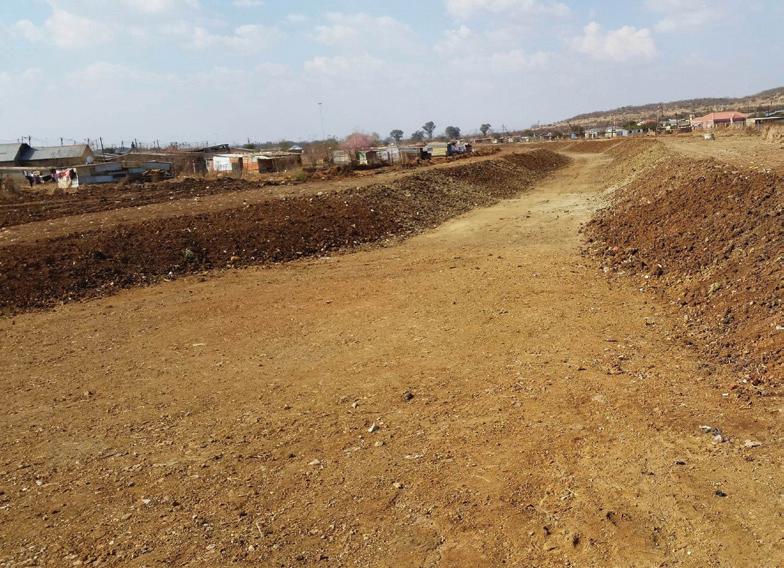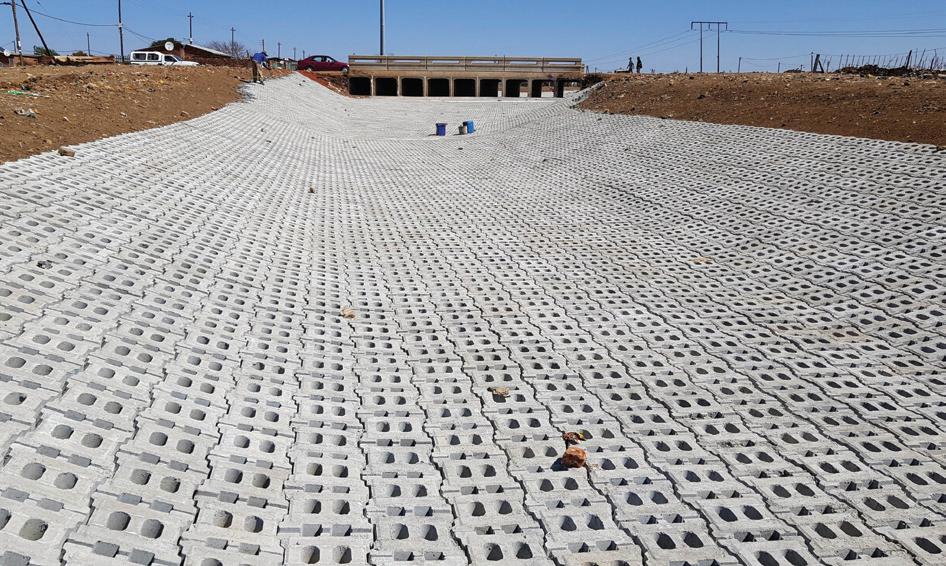
4 minute read
Finding solutions for residential paving projects
Two large-scale paving projects with completely different requirements were recently completed by CMA member, Technicrete, in the North West and Gauteng provinces respectively.
In the first project in North West, Technicrete was able to assist Ikageng in its attempt to set aside stands for development below the 100-year flood line and take preventive measures to reduce the possibility of stormwater or flood damage to the area. Technicrete’s Armorflex proved to be the most effective and sustainable option to meet their requirements.
“The project was initiated after it became apparent that some residential stands were set out within the 1:50 year flood line. The formalisation of the trapezoidal channel to contain the 1:100-year flood meant these stands would be available for development. The construction of a lined channel could increase the capacity with a smaller crosssectional area,” says Dries Joubert, design engineer from FHP Consulting Engineers on the Ikageng project.
Finding solutions
FOR RESIDENTIAL PAVING PROJECTS
Drainage channel
Technicrete’s internationally licensed Armorflex 180 was recommended as the best option for the Ikageng project from the range of products available. The 180 is an open block suitable for stormwater and drainage channels, erosion control, roadside drains, strip roads and access roads.
“We originally thought that a combined

concrete and concrete-filled geo cell-type lined canal would serve the purpose, but due to poor soil conditions which required substantial earthworks, Armorflex was the preferred option and offered a reduced construction period – mainly because of the interlocking pattern that offered flexibility, should settlement occur. The channel had a natural alignment and the Armorflex improved the natural flow characteristics of the channel during flood conditions, hence its gently curved installation which eliminates the small radius bends that could have created overtopping,” explains Joubert.
The project required the Armorflex 180 blocks to be tied to adjacent blocks with galvanised wire to form long mats. As and where required, these were also anchored into in-situ soil to further assist with stabilisation of the blocks and mat in general.
Flexible fit
The blocks provided a loose, but sophisticated interlocking design, allowing the surface to remain flexible to movement without the cracking and spalling issues that occur with in-situ cast concrete when exposed to regular stormwater or flooding incidents.

The project showed the versatility of the Technicrete solution, which offers a good lining for drainage channels. At aprons at pipe inlets and outlets, Armorflex eliminates pipe undercutting that can lead to severe problems such as surrounding bank failure and hence additional siltation downstream.
One of the challenges on site at Ikageng was groundwater seepage, which impacted the delivery of project products. “Due to water seeping from underground at the project site, which resulted in wet and muddy surfaces, we built a temporary roadway so that Technicrete could deliver the daily quantity of 1 000m² blocks required,” says Anton Muller, managing director of Born Free Civils, a contractor at the Ikageng project.
Approximately 40 000m² of blocks were placed in three months just before the summer rains. To achieve this, the channel profile was pre-prepared to allow the installation team to finalise and smooth out levels, place geofabric and Armorflex, wire up the system and backfill.
Conformity first
While the technical challenges on the Ikageng project were many and varied, the other project had the opposite requirement, concerning mainly the aesthetics of the paving to complement the cultivated sprawling garden in Groenkloof, Tshwane.
Whether it is a residential estate or a commercial park, style conformity always plays an important role in the success of such developments. The choice of paving plays a role not only in appearance, but also in future maintenance planning. These were the key factors when the owner of a house in a residential complex in Herbert Baker Street decided to demolish and revamp their home after 15 years.
Maxi Pave, the contractors for the owner’s house rebuild, contracted Technicrete to supply 1 500m2 of Conleaf Autumn 60mm pavers and 150m2 of Bond Brick Autumn 55mm pavers for the parking and driveway areas of the refurbished property. Managing director of Maxi Pave, Leon Veldsman, says: “The company’s Conleaf and Bond Brick pavers are aesthetically attractive and the longevity of the products makes them ideal for this residence.
Attractive patterns
“Technicrete supplied the original paving to this small complex many years ago, but after seeing the Conleaf design and colour installed at one of the residences, the owners decided to re-pave the driveways and entrances in the same manner of the other three units as well.”
The Conleaf paver introduces gentle curves into paving, creating attractive patterns, pleasing lines and durability. This block is available in all standard colours, such as Autumn, Terracotta, Grey, Plum, Slate and Tan and is suitable for domestic driveways, municipal parking areas, pedestrian pavements, pathways and commercial developments. The larger 80mm thickness can be installed at petrol station forecourts, industrial and factory roads, as well as suburban streets.
Technicrete’s Bond Brick is a traditional paver that is not only economical, but durable. It is also available in various colours and thicknesses and is mainly applied to parking areas, pathways, commercial and domestic surfaces.
(Above): Preparation work in progress for the Ikageng project and the completed drainage channel.
(Left): The paving project in Groenkloof, Tshwane.










